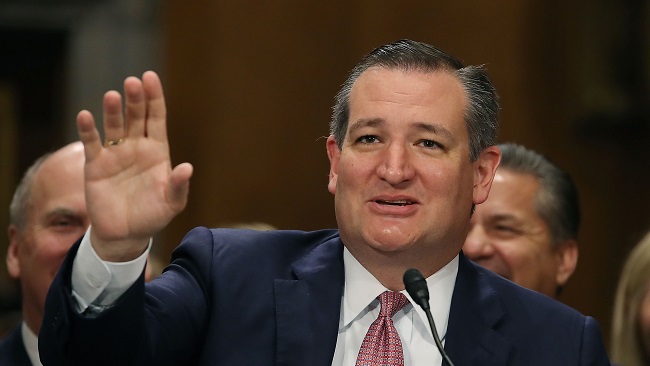
For two days straight, Donald Trump has attacked his own attorney general, Jeff Sessions, in a string of tweets and statements. The president is apparently miffed at the former Alabama senator’s recusal from all things Russia, as well as his supposed lack of focus on pursuing any investigation of Hillary Clinton’s alleged crimes as Secretary of State. Subsequent reports have indicated Trump has discussed the possibility of firing Sessions with his advisors, who are floating names for a possible replacement. A rumor about former New York Mayor Rudy Giuliani popped up as a result, but the keen Trump ally quickly denied it.
According to the Washington Post, however, a second name has been mentioned in the White House — that Sen. Ted Cruz (R-Texas), a bitter rival of Trump’s during the Republican primaries who ultimately left voicemail message for the nominee’s campaign. Cruz, whose father was targeted by Trump as a possible accomplice in the assassination of President John F. Kennedy, served as the Solicitor General of Texas before campaigning for senator with the Tea Party ticket in 2012 and 2013. Considering his background as an attorney at the state level (much like Sessions before him), Cruz would actually be a more freshly experienced candidate for the role than Giuliani.
Unfortunately for Trump, a few roadblocks would prevent him from nominating Cruz, Giuliani, or anyone else — especially if his rising desire to fire Special Counsel Robert Mueller are part of the deal. As the Post points out, Sessions’ recusal technically means the president would have to consult with Deputy Attorney General Rod Rosenstein and Associate Attorney General Rachel Brand to do so. Neither is likely to fire Mueller if ordered, and they may even “quit instead of doing so,” Either way, Trump can simply appoint an acting attorney general in their absence, though his authority becomes quite “murky”:
The Justice Department has issued opinions in the past saying that such a move is and isn’t permissible. And his pick for an acting attorney general would have to have Senate confirmation and be serving elsewhere in the government or have worked in the Justice Department for 90 days within the past 365 and be at a certain senior pay level.
Per University of Texas School of Law’s Steve Vladeck, however, the president could simply bypass all of this by making a “recess appointment” in August, when Congress takes a break from its current session. Whoever Trump appoints in such a case would serve until the current session ends on January 3, 2019, and would “have the same authority as someone who is confirmed by the Senate” sans confirmation hearings. In other words, Cruz could theoretically bypass being questioned by his truest friend, Sen. Al Franken (D-Minnesota).
(Via Washington Post)
